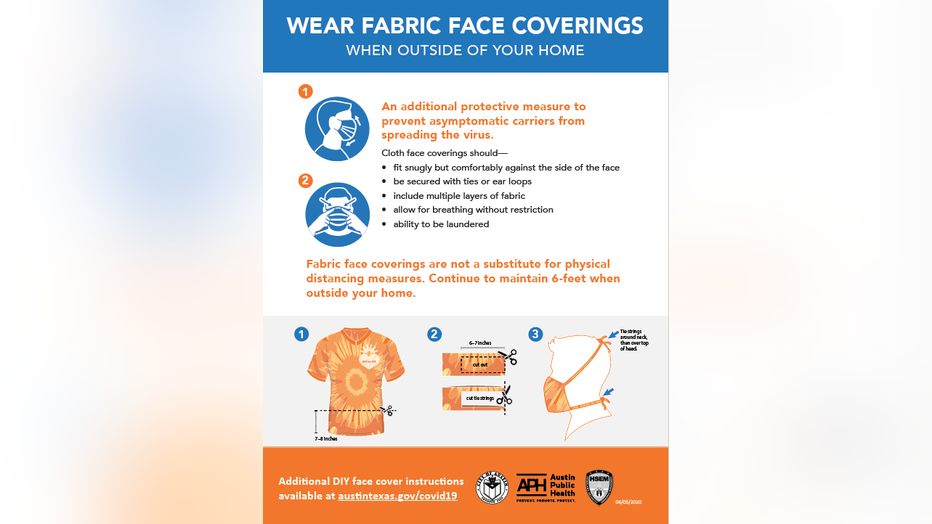How to use and remove gloves, masks safely
AUSTIN, Texas - The best form of protection from COVID-19 is to stay at home, but we all need to leave our houses occasionally for groceries and other essentials. If you're leaving the house to go to a grocery store, you should wear a mask and gloves if possible.
The Centers for Disease Control and Prevention has recommended that all Americans who are leaving the house and coming into contact with other people wear masks and gloves. The CDC released guidelines regarding the public use of fabric face coverings earlier this week.
The measures are meant to act as an additional protective measure to prevent asymptomatic carriers from spreading the virus.
Some exceptions include young children under age 2, anyone who has trouble breathing or anyone who is unable to remove the covering without help.
T-shirts or bandannas can be used to cover the nose and mouth when outside the home — for instance, at the grocery store or pharmacy. Medical-grade masks, particularly short-in-supply N95 masks, should be reserved for those dealing directly with the pandemic
Masks and gloves can protect you against contact with infectious materials. However, once contaminated, gloves can become a means for spreading infectious materials to yourself, others or environmental surfaces. Dr. Pradeep Kumar sat down with FOX 7 Austin to explain the proper technique for safely taking on and off your masks and gloves.
HOW TO PUT ON YOUR MASKS AND GLOVES SAFELY
- Wash your hands
- Put mask on
- Put gloves on
MASKS

(Austin Public Health)
Masks should fully cover the nose and mouth and fit snuggly over both. Remember, you don’t want to be touching it during use so take the few seconds needed to make sure it is secure on your head and fits snuggly around your face so there are no gaps.
GLOVES
Insert each hand into the appropriate glove and adjust as needed for comfort and dexterity. If you are wearing long sleeves, tuck the gown cuffs securely under each glove. This provides a continuous barrier protection for your skin.
HOW TO SAFELY USE MASKS AND GLOVES
- Keep gloved hands away from face
- Avoid touching or adjusting other PPE
- Remove gloves if they become torn; perform hand hygiene with sanitizer or hand washing before donning new gloves
- Limit surfaces and items touched
HOW TO REMOVE YOUR MASKS AND GLOVES SAFELY
To remove your gloves and masks safely, you must first be able to identify what sites are considered “clean” and what are “contaminated.” In general, the outside front of the mask is considered “contaminated,” regardless of whether there is visible soil. Also, the outside of the gloves are contaminated.
The areas that are considered “clean” include inside the gloves and the ear pieces of the mask.
- Using one gloved hand, grasp the outside of the opposite glove near the wrist. Pull and peel the glove away from the hand. The glove should now be turned inside-out, with the contaminated side now on the inside.
- Hold the removed glove in the opposite gloved hand.
- Slide one or two fingers of the ungloved hand under the wrist of the remaining glove. Peel glove off from the inside, creating a bag for both gloves.
- Discard in a waste container.
- Wash your hands
- Using ungloved hands, grasp the “clean” ear or head pieces of your mask and lift away from your face.
- If the mask is reusable, place them in a designated receptacle for subsequent reprocessing. Otherwise, discard them in the waste container.
- Wash your hands
WATCH LIVE COVERAGE FROM FOX 7 AUSTIN
DOWNLOAD THE FOX 7 AUSTIN NEWS APP FOR YOUR MOBILE DEVICE
Symptoms for coronavirus COVID-19 include fever, coughing, and shortness of breath. These, of course, are similar to the common cold and flu.
Expect a common cold to start out with a sore or scratchy throat, cough, runny and/or stuffy nose. Flu symptoms are more intense and usually come on suddenly, and can include a high fever.
Symptoms of COVID-19 may appear more slowly. They usually include fever, a dry cough and noticeable shortness of breath, according to the World Health Organization. A minority of cases develop pneumonia, and the disease is especially worrisome for the elderly and those with other medical problems such as high blood pressure, obesity, diabetes or heart conditions.
Right now there's one big difference between flu and coronavirus: A vaccine exists to help prevent the flu and it's not too late to get it. It won't protect you from catching the coronavirus but may put you in a better position to fight it.
To protect yourself, wash your hands well and often, keep them away from your face, and avoid crowds and standing close to people.
And if you do find yourself showing any of these flu or coronavirus symptoms - don't go straight to your doctor's office. That just risks making more people sick, officials urge. Call ahead, and ask if you need to be seen and where.
CLICK HERE FOR THE LATEST INFO ON THE CORONAVIRUS OUTBREAK
---
FOX 7 Austin is working to keep you up to date with coronavirus, with both local and national developments. Every weekday we're live at 1 p.m. with a special show reporting the latest news, prevention tips and treatment information.
You can watch live in your FOX 7 Austin app or on the FOX 7 Austin Facebook page.
You can also get the latest COVID-19 news from around the country at coronavirusnow.com.

